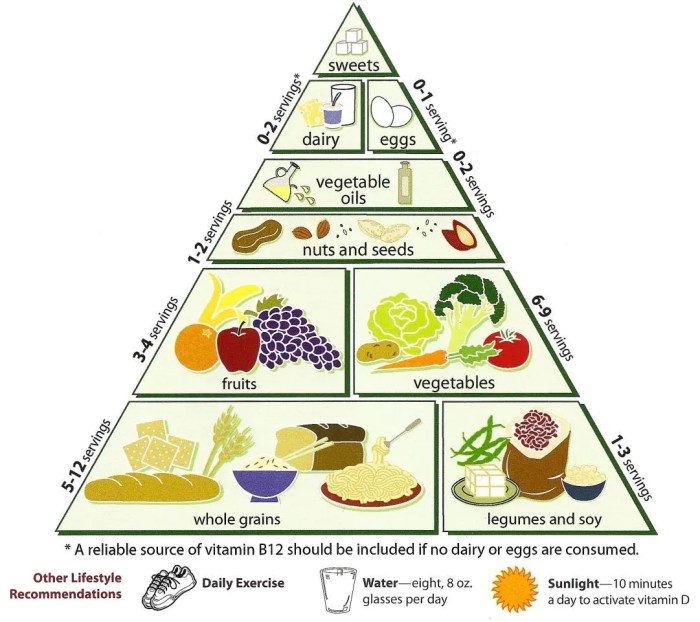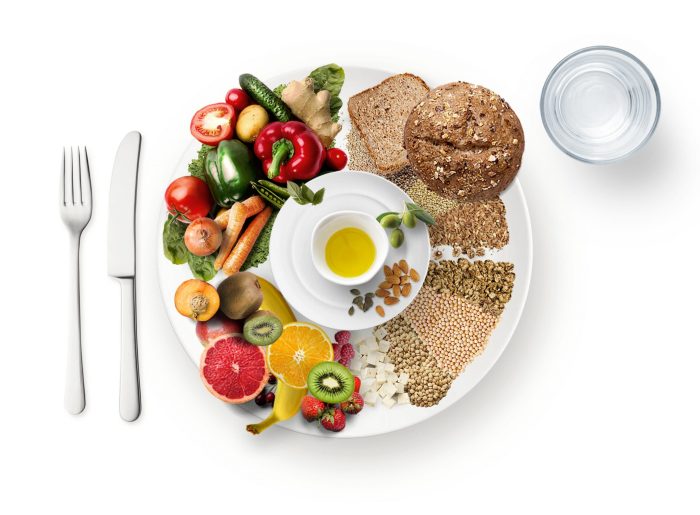As typical vegetarian diet takes center stage, this opening passage beckons readers with fimela author style into a world crafted with good knowledge, ensuring a reading experience that is both absorbing and distinctly original.
The typical vegetarian diet, a plant-based eating pattern, has gained widespread recognition for its potential health benefits and ethical considerations. Join us as we delve into the intricacies of this dietary approach, exploring its nutritional value, health implications, and practical aspects.
Definition of a Typical Vegetarian Diet
A vegetarian diet is a plant-based diet that excludes meat, poultry, fish, and seafood. Vegetarian diets are often motivated by ethical concerns about animal welfare, environmental sustainability, or health reasons.
There are different types of vegetarian diets, each with varying levels of restriction:
Lacto-ovo Vegetarian Diet
Lacto-ovo vegetarians consume dairy products (such as milk, cheese, and yogurt) and eggs in addition to plant-based foods.
Vegan Diet
Vegans exclude all animal products, including dairy, eggs, and honey. They rely solely on plant-based foods.
Pescatarian Diet
Pescatarians include fish and seafood in their diet but exclude other types of meat.
Nutritional Considerations

A vegetarian diet offers an array of nutritional benefits, but it also presents certain challenges in meeting nutrient requirements. Understanding these considerations is crucial for ensuring optimal health on a plant-based diet.
Vegetarian diets are generally rich in fiber, antioxidants, vitamins, and minerals. They may promote heart health, reduce the risk of chronic diseases, and support a healthy weight. However, vegetarians need to pay special attention to certain nutrients to avoid deficiencies.
Protein
Protein is essential for building and repairing tissues. Plant-based sources of protein include beans, lentils, tofu, tempeh, and nuts. Vegetarians should aim to consume a variety of these foods to meet their protein needs.
Iron
Iron is necessary for carrying oxygen throughout the body. Plant-based sources of iron include fortified cereals, beans, lentils, and leafy green vegetables. Vegetarians should consume these foods with vitamin C-rich foods, such as citrus fruits, to enhance iron absorption.
Vitamin B12
Vitamin B12 is essential for the nervous system and blood cells. It is not naturally found in plant foods, so vegetarians need to obtain it from fortified foods or supplements.
By consuming a balanced and varied diet, vegetarians can meet their nutrient requirements and enjoy the health benefits of a plant-based lifestyle.
Health Implications

Vegetarian diets have been associated with numerous health benefits, including reduced risk of chronic diseases and improved overall well-being. However, it is important to note that potential risks and concerns may arise from a vegetarian diet if not planned carefully.
Research has consistently shown that vegetarians have lower rates of heart disease, stroke, type 2 diabetes, and some types of cancer compared to non-vegetarians. Vegetarian diets are typically rich in fruits, vegetables, whole grains, and legumes, which provide an abundance of fiber, antioxidants, and phytochemicals that have protective effects against these diseases.
Embarking on a vegetarian diet can have profound implications for your well-being. Studies have consistently shown that a plant-based diet is associated with a lower risk of chronic diseases, including heart disease, stroke, and type 2 diabetes. Vegetarian diets are typically rich in fruits, vegetables, and whole grains, which are packed with essential nutrients, antioxidants, and fiber.
Potential Risks and Concerns
While vegetarian diets offer many health benefits, it is important to be aware of potential risks and concerns:
- Vitamin B12 deficiency:Vitamin B12 is primarily found in animal products, and vegetarians may need to supplement or consume fortified foods to ensure adequate intake.
- Iron deficiency:Iron is less bioavailable from plant sources than from animal sources, and vegetarians may need to consume iron-rich foods such as beans, lentils, and fortified cereals.
- Calcium deficiency:Calcium is essential for bone health, and dairy products are a primary source of calcium. Vegetarians may need to consume fortified plant-based milks, leafy green vegetables, and calcium supplements to meet their calcium needs.
- Protein deficiency:Protein is essential for muscle growth and repair, and vegetarians may need to combine different plant-based protein sources, such as legumes, nuts, and grains, to ensure adequate protein intake.
Health Outcomes of Vegetarians vs. Non-vegetarians
Numerous studies have compared the health outcomes of vegetarians and non-vegetarians. A large-scale study published in the journal JAMA Internal Medicine found that vegetarians had a 12% lower risk of all-cause mortality compared to non-vegetarians. Vegetarians also had a lower risk of cardiovascular disease, stroke, and type 2 diabetes.
Another study published in the journal The Lancet found that vegetarians had a 22% lower risk of coronary heart disease compared to non-vegetarians. The study also found that vegetarians had lower blood pressure and cholesterol levels than non-vegetarians.
Practical Considerations: Typical Vegetarian Diet
Transitioning to and maintaining a vegetarian diet requires planning and effort. Here are some practical tips and advice to help you navigate the journey.
It’s important to start gradually by reducing meat consumption and incorporating more plant-based foods into your meals. Seek support from family, friends, or a registered dietitian to ensure you meet your nutritional needs.
Challenges and Obstacles, Typical vegetarian diet
- Social situations:Attending events where meat-based dishes are the norm can be challenging. Bring your own vegetarian dishes or inform hosts of your dietary preferences in advance.
- Dining out:Research restaurants that offer vegetarian options or call ahead to inquire about menu modifications. Look for ethnic cuisines that often feature plant-based dishes.
Meal Planning and Recipe Ideas
Meal planning is crucial for a balanced vegetarian diet. Include a variety of fruits, vegetables, whole grains, legumes, and nuts. Use online resources, cookbooks, or apps for vegetarian recipes.
- Breakfast:Oatmeal with berries and nuts, tofu scramble, vegetarian breakfast burritos
- Lunch:Salads with grilled tofu, quinoa bowls, vegetarian sandwiches
- Dinner:Vegetarian chili, lentil soup, pasta dishes with vegetables
Resources for Vegetarian Support
- Vegetarian organizations:Join organizations like the Vegetarian Resource Group or the American Vegetarian Association for support and resources.
- Online forums and social media groups:Connect with other vegetarians online to share experiences, ask questions, and get recipe ideas.
- Vegetarian cooking classes:Take classes to learn new cooking techniques and expand your vegetarian repertoire.
Environmental Impact
Vegetarian diets have a significantly lower environmental impact compared to non-vegetarian diets. Animal agriculture contributes heavily to greenhouse gas emissions, water consumption, and land use, making it a major contributor to climate change and environmental degradation.
Greenhouse Gas Emissions
Livestock production, particularly cattle farming, releases significant amounts of methane, a potent greenhouse gas. Methane has a global warming potential 25 times higher than carbon dioxide, contributing to climate change. Vegetarian diets eliminate or reduce the consumption of animal products, thereby reducing methane emissions.
Water Consumption
Animal agriculture is a major consumer of water. Raising livestock requires vast amounts of water for feed production, animal drinking, and waste management. Vegetarian diets, which rely on plant-based foods, require significantly less water compared to non-vegetarian diets.
Land Use
Animal agriculture requires extensive land for grazing, feed production, and waste disposal. Converting forests and natural habitats into agricultural land for livestock farming contributes to deforestation, habitat loss, and biodiversity decline. Vegetarian diets, by reducing the demand for animal products, help conserve land and protect ecosystems.
Cultural and Ethical Perspectives
Vegetarianism is not merely a dietary choice; it is often intertwined with cultural and ethical beliefs. People embrace vegetarianism for a myriad of reasons, including religious, philosophical, and compassionate motivations.
In many Eastern religions, such as Hinduism, Buddhism, and Jainism, vegetarianism is deeply rooted in the principles of non-violence (ahimsa) and compassion for all living beings. Followers of these religions believe that animals possess a soul and should not be harmed or killed for food.
Philosophical Vegetarianism
Some individuals adopt vegetarianism based on philosophical principles. They argue that it is morally wrong to kill animals for food, as animals are sentient beings capable of experiencing pain and suffering. This ethical stance aligns with the philosophy of utilitarianism, which seeks to maximize happiness and minimize harm for all.
Compassionate Vegetarianism
Compassion for animals is another driving force behind vegetarianism. Many people choose to abstain from meat out of empathy for the animals raised and slaughtered for food. They believe that factory farming practices often subject animals to inhumane conditions and unnecessary suffering.
Historical and Cultural Evolution
Vegetarianism has a long and diverse history across different cultures. In ancient Greece, the philosopher Pythagoras advocated for a vegetarian diet based on ethical and health concerns. In the Roman Empire, vegetarianism was practiced by some religious sects, such as the Pythagoreans and the Orphics.
During the Middle Ages, vegetarianism declined in popularity in Europe due to the rise of Christianity, which did not explicitly forbid the consumption of meat. However, vegetarianism continued to be practiced in some Eastern cultures, such as India and China.
Embracing a vegetarian diet can unlock a world of health benefits. Studies have shown that vegetarians tend to have lower rates of heart disease, certain cancers, and type 2 diabetes compared to meat-eaters. This is largely due to the abundance of fruits, vegetables, and whole grains that form the foundation of a vegetarian diet, which are rich in fiber, vitamins, and antioxidants.
In the 19th century, vegetarianism experienced a revival in the West, influenced by the writings of philosophers such as Henry David Thoreau and Leo Tolstoy. Today, vegetarianism is widely practiced around the world, with various motivations ranging from ethical concerns to environmental and health considerations.
Final Conclusion

In conclusion, the typical vegetarian diet presents a compelling alternative to traditional meat-based diets, offering a myriad of health benefits and ethical considerations. While careful planning and supplementation may be necessary to ensure adequate nutrient intake, the potential rewards of adopting a plant-based lifestyle can be substantial.
Whether driven by health concerns, ethical beliefs, or environmental consciousness, the typical vegetarian diet remains a viable and rewarding choice for those seeking a healthier and more sustainable way of life.
Detailed FAQs
Is a vegetarian diet nutritionally complete?
With careful planning and supplementation, a vegetarian diet can provide all the essential nutrients for good health. However, it is important to pay attention to protein, iron, and vitamin B12 intake.
What are the health benefits of a vegetarian diet?
Research suggests that vegetarian diets may reduce the risk of chronic diseases such as heart disease, stroke, type 2 diabetes, and some types of cancer.
Is it difficult to transition to a vegetarian diet?
Transitioning to a vegetarian diet can be gradual and does not have to be overwhelming. Start by incorporating more plant-based meals into your weekly routine and gradually reduce meat consumption.